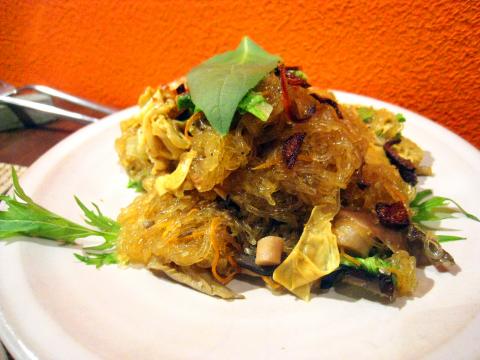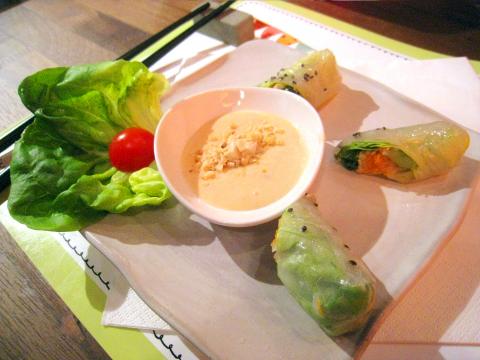While vegetarian food is not hard to find in Taipei, it certainly suffers from a lack of variety. This is, admittedly, the observation of a confirmed carnivore, whose periodic ventures into the world of vegetarian cuisine have usually left me uninspired.
The newly opened Chamkar, which serves Cambodian-inspired vegetarian food prepared by French owner Nicolas Devaux, is therefore a welcome addition to the fold.
Chamkar sports a clean, simple design that mixes exposed concrete with wood furnishings and a restrained use of Cambodian ornamentation. The overall effect is contemporary without being cold, and the widely spaced tables make for a very comfortable dining environment. The glass frontage looks over a small garden, softening the overall effect further.

Photo: Ian Bartholomew, Taipei TImes
An absence of Buddhist chanting, religious knickknacks, or servers in ostentatiously homespun robes,boded well.
The restaurant offers a lunch set menu (NT$270), two dinner set menus (NT$340 and NT$390), a children’s set menu (NT$190) and an a la carte selection. The lunch set, from which I ordered, offered a choice of two appetizers, six mains and three desserts, and a beverage. The selection looked very appealing on the page, and on the whole, the dishes I tried did not disappoint.
The winter salad of green leaves, sunflower seeds and wolfberries (枸杞) tossed with a mustard dressing suffered from a lack of variety in the leaves, dominated by the ubiquitous iceburg lettuce, but the dressing was bold without being overwhelming and the wolfberries provided a vibrant burst of flavor. It was a contrast to the other appetizer, a grilled papaya and vegetable soup. This was a light, clear soup subtlety infused with cinnamon, and while it did not blow me away, its flavors were nicely balanced.

Photo: Ian Bartholomew, Taipei TIme
A dish of pumpkin and pineapple with curry paste, coconut milk, toasted peanuts and fresh herbs was a highlight, packed with creamy, rich flavors. It was served with nicely cooked brown rice. The fresh herbs that Devaux uses really shine through.
The set was letdown by a dish of stir-fried glass noodles with curry paste, tofu skin and vegetables, which strived for elegance but didn’t quite achieve it and was visually less appealing.
Not having eaten Cambodian food before, I at least had the feeling that I was trying something different (rather than Thai or Vietnamese food under a different label). Chamkar is an offshoot of a restaurant that Devaux already runs in Cambodia, and he explained that Cambodian food is more closely related to Thai than Vietnamese, though more sweet and less spicy.
The children’s set menu was well thought out. The fresh spring rolls with a sweet peanut and chili sauce looked very attractive, immediately attracting the attention of the four-year-old I had brought along, and the Italian pasta with vegetable Bolognese sauce provided something familiar for children without compromising the restaurant’s commitment to the use of fresh herbs. All dishes can be prepared without garlic.
Chamkar offered a chocolate and a banana cake for dessert the day I visited. Both were tasty, though more home-cooking than restaurant food in their presentation.
Taken as a whole, the food was better, and more thoughtfully prepared and presented, than many other establishments offering a three-course set at a similar price point. Most notably, the flavors were clean and strong without resorting to heavy seasoning, a feat that must be applauded. While the absence of meat was disappointing (I thought the pumpkin dish would be really splendid with a red beef curry), I left Chamkar with the feeling of having enjoyed a satisfying gastronomic experience.

In the March 9 edition of the Taipei Times a piece by Ninon Godefroy ran with the headine “The quiet, gentle rhythm of Taiwan.” It started with the line “Taiwan is a small, humble place. There is no Eiffel Tower, no pyramids — no singular attraction that draws the world’s attention.” I laughed out loud at that. This was out of no disrespect for the author or the piece, which made some interesting analogies and good points about how both Din Tai Fung’s and Taiwan Semiconductor Manufacturing Co’s (TSMC, 台積電) meticulous attention to detail and quality are not quite up to

April 21 to April 27 Hsieh Er’s (謝娥) political fortunes were rising fast after she got out of jail and joined the Chinese Nationalist Party (KMT) in December 1945. Not only did she hold key positions in various committees, she was elected the only woman on the Taipei City Council and headed to Nanjing in 1946 as the sole Taiwanese female representative to the National Constituent Assembly. With the support of first lady Soong May-ling (宋美齡), she started the Taipei Women’s Association and Taiwan Provincial Women’s Association, where she

Chinese Nationalist Party (KMT) Chairman Eric Chu (朱立倫) hatched a bold plan to charge forward and seize the initiative when he held a protest in front of the Taipei City Prosecutors’ Office. Though risky, because illegal, its success would help tackle at least six problems facing both himself and the KMT. What he did not see coming was Taipei Mayor Chiang Wan-an (將萬安) tripping him up out of the gate. In spite of Chu being the most consequential and successful KMT chairman since the early 2010s — arguably saving the party from financial ruin and restoring its electoral viability —

It is one of the more remarkable facts of Taiwan history that it was never occupied or claimed by any of the numerous kingdoms of southern China — Han or otherwise — that lay just across the water from it. None of their brilliant ministers ever discovered that Taiwan was a “core interest” of the state whose annexation was “inevitable.” As Paul Kua notes in an excellent monograph laying out how the Portuguese gave Taiwan the name “Formosa,” the first Europeans to express an interest in occupying Taiwan were the Spanish. Tonio Andrade in his seminal work, How Taiwan Became Chinese,